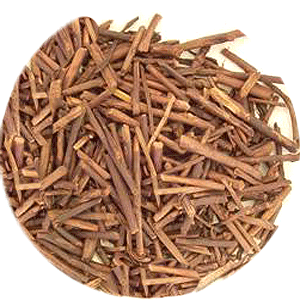Message

Kukicha
This is the highest grade of Kukicha available before you get into a stratoshpshere of highest prices. Kukicha has an emerald green infusion and creamy mouth feel with a balanced flavor with a chestnut note - a very distinctive Japanese tea taste. When feeling adventuresome, please give our Kukicha tea tea a try. And revel in unique, playful taste of one of the best Japanese teas.
Variant price modifier:
Sales price:
Discount:
Tax amount:
Country of Origin: Japan
Like sencha green tea, there are myriad health benefits of kukicha tea. It is made by first steaming the harvested plant. The twigs are sun dried and then stored in paper bags for two to three years, allowing the flavor to develop. Following the aging process, they are cut to specific lengths, and then grouped according to their grade. Each grade of Kukicha is roasted for different durations and temperatures in order to end with the consistent desired taste of kukicha twig tea - light, nutty and slightly creamy.
In Japan, kukicha still carries the stigma of a poor man's beverage, but in the West, this Japanese tea has been embraced for its remarkable ability to stabilize health and promote longevity, as well as for its rich taste. It plays a central role in the macrobiotic diet, which is based on the belief that balance is the key to optimum well-being. The macrobiotic diet consists of mostly whole grains, fruits and vegetables, legumes and seaweed, with kukicha as one of the recommended beverages.
Kukicha
Kukicha is an unusual green tea. This Japanese tea is made from the leaves, twigs, and stems of the tea tree. In Uji Japan, the old tea district located between the ancient capitals of Nara and Kyoto, tea farmers developed a precise method for creating this 'peasant's drink'.Like sencha green tea, there are myriad health benefits of kukicha tea. It is made by first steaming the harvested plant. The twigs are sun dried and then stored in paper bags for two to three years, allowing the flavor to develop. Following the aging process, they are cut to specific lengths, and then grouped according to their grade. Each grade of Kukicha is roasted for different durations and temperatures in order to end with the consistent desired taste of kukicha twig tea - light, nutty and slightly creamy.
In Japan, kukicha still carries the stigma of a poor man's beverage, but in the West, this Japanese tea has been embraced for its remarkable ability to stabilize health and promote longevity, as well as for its rich taste. It plays a central role in the macrobiotic diet, which is based on the belief that balance is the key to optimum well-being. The macrobiotic diet consists of mostly whole grains, fruits and vegetables, legumes and seaweed, with kukicha as one of the recommended beverages.
